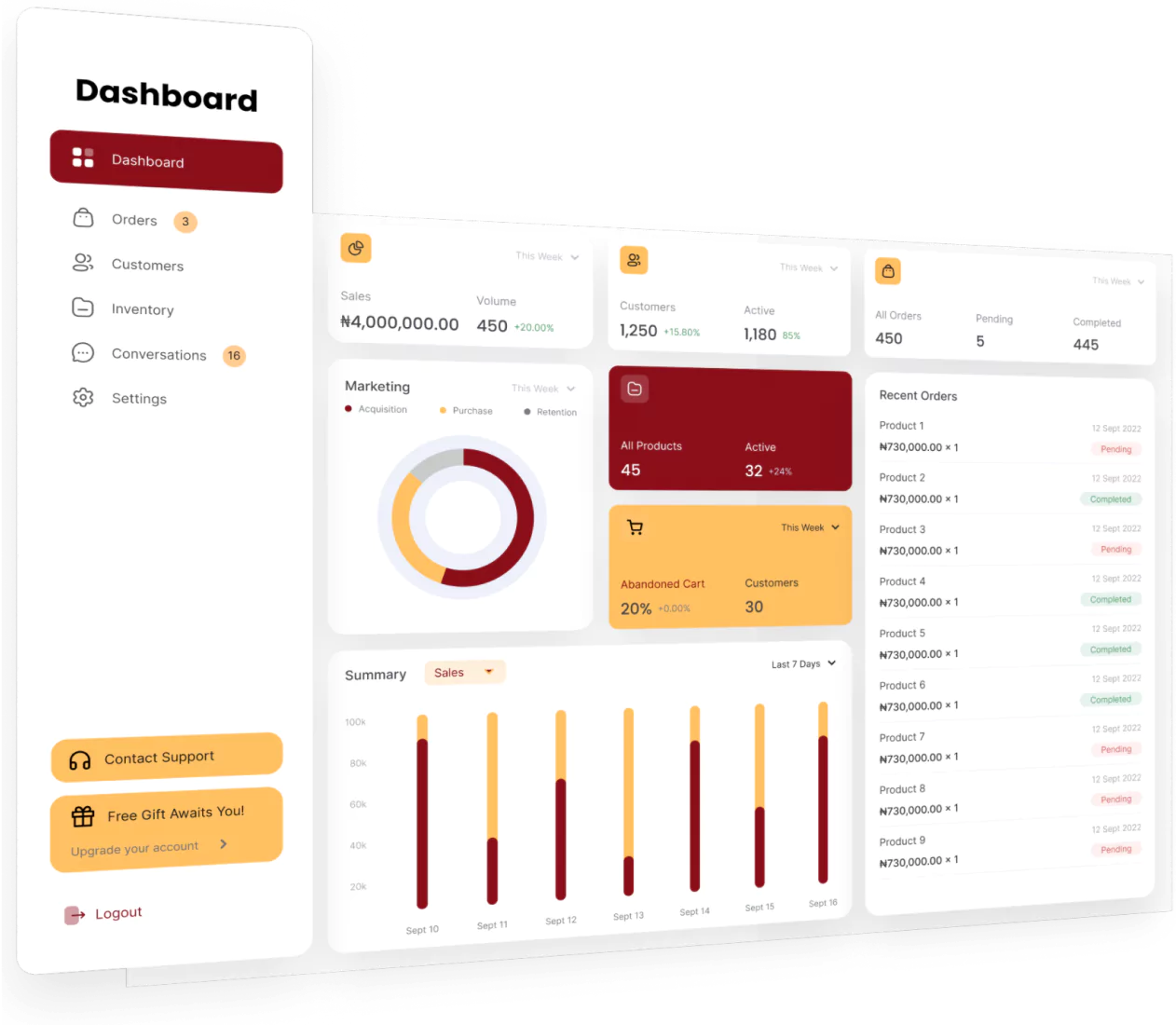Building strong business relationships begins with a simple connection, but maintaining them requires organization. Missing a follow-up or losing track of valuable leads can result in missed opportunities. This is why contact management is essential for effective communication and long-term success.
Contact management involves organizing, storing, and accessing client, lead, and stakeholder information. It keeps key details, such as emails and phone numbers, easily accessible. Without it, businesses face inefficiencies, fragmented communication, and weakened relationships.
In this article, we’ll explore what contact management is, why it’s crucial for your business and the benefits it offers.Sa huli, mauunawaan mo kung paano ang tamang estratehiya ay makakapagpaganda ng operasyon at magpapalakas ng relasyon.
Table of Contents

Key Takeaways
|
What is Contact Management?
Contact management is the process of systematically storing, organizing, and managing information about the people or organizations with whom a business interacts. This information often includes names, email addresses, phone numbers, job titles, company details, and a record of past communications.
By consolidating this data in one place, contact management makes it easier for businesses to keep track of important relationships, follow up effectively, and maintain consistent communication.
Whether it’s nurturing client connections, collaborating with partners, or managing leads, a good contact management system is essential for improving efficiency and ensuring teams can work seamlessly together.
Why is Contact Management Important for Companies?
Effective contact management is crucial for businesses to maintain strong relationships, streamline operations, and drive growth. Here are the key reasons why it’s so important:
1. Streamlined access to essential information
Storing all contact information and communication history in a single, organized system such as CRM software, makes it easy for employees to find the details they need quickly. This includes key information like phone numbers, email addresses, meeting notes, and past interactions with clients or partners.
With everything stored in one place, teams can make decisions more quickly and accurately, ensuring no important information is missed or overlooked. A well-structured contact management software helps prevent delays and errors, allowing for smoother operations and improved customer service.
2. Increased productivity and efficiency
Contact management tools are designed with several automated features that help businesses stay organized and efficient. For example, these tools can send automated reminders for follow-ups, schedule tasks, and even integrate with other software such as email platforms or CRM.
This automation removes the burden of manually tracking every task and communication, so employees can focus on more strategic or high-priority activities. With automated processes that handle routine operations, sending reminders, teams can work more efficiently, reduce the risk of human error, and ensure no important details are overlooked.
3. Better business decision making
Effective contact management provides valuable insights to businesses by organizing and tracking key data about clients, prospects, and partners. When contact information is managed well, it allows decision makers to analyze customer behavior, preferences, and past interactions.
With a clear understanding of customer engagement, businesses can make informed decisions about resource allocation, marketing strategies, and sales approaches.
Ultimately, good contact center management empowers leaders to make smarter, data-driven decisions that align with business goals and improve overall performance.
4. Scalability and growth
As businesses expand, managing a growing number of contacts can become overwhelming. A reliable system helps companies keep track of customer and partner information as they scale, ensuring that no details are lost.
With an organized system in place businesses can continue to build relationships efficiently and maintain high-quality service, even as their operations grow. This allows companies to handle growth smoothly and sustain longterm success.
Difference between Contact Management and Customer Relationship Management
Understanding the difference between contact management and CRM is crucial for choosing the right tool. While they share similarities, each serves unique purposes to support business needs:
| Aspect | Contact Management | Customer Relationship Management (CRM) |
| Definition | A system focused on storing and organizing basic contact information. | A comprehensive system designed to manage all interactions and relationships with customers. |
| Primary Purpose | To maintain and organize contact details, such as names, emails, and phone numbers. | To analyze customer interactions, improve relationships, and drive business growth. |
| Features | Includes basic tools for storing contact information and tracking communication. | Offers advanced tools like sales tracking, analytics, customer segmentation, and automation. |
| Automation | Minimal automation, focusing mainly on reminders and basic updates. | Extensive automation features, including workflows, task scheduling, and data analysis. |
| Cost | Generally more affordable due to its simpler features. | Usually more expensive, reflecting its broader capabilities and advanced tools. |
This comparison highlights the key differences, making it easier to understand which solution aligns best with specific business needs.
Key Benefits of Contact Management for Companies
Contact management offers a wide range of advantages for businesses, particularly when combined with the powerful features of customer engagement tools. Below are the key benefits explained in detail:
- Lower costs: A system streamlines data handling by centralizing customer information, saving time and effort. It eliminates the need for manual organization or searching across multiple sources, allowing businesses to manage customer relationships more efficiently through automation.
- Increase agility: Sales professionals need quick access to lead information to convert leads into customers. A system offering CRM benefits keeps all client details, such as names, phone numbers, and emails, in one place, making it easier and faster to reach out. By centralizing this data, teams can save time and communicate more efficiently.
- Aid digital transformation: Systems automate routine tasks, helping to streamline communication on a larger scale. These systems can also be integrated with marketing automation platforms and CRM software. Their ability to connect with other tools and support business growth makes contact management systems an essential asset for digital transformation.
Essential Features of Contact Management Software for Business Success
Contact management software is essential for business success, helping to organize and streamline customer interactions. Understanding its key features is crucial for maximizing its potential. Let’s take a look at the core elements that make these tools so effective.
1. Central dashboard: A system usually features a central dashboard where users can easily access all its functions. You can select specific tools from this dashboard, such as filtering data or searching for customers. It also allows you to access and adjust the system settings. In most systems, all data is just a few clicks away from the central dashboard, ensuring quick and efficient navigation.
2. Extract and import data: A system links you to data from multiple sources, allowing you to access information from a app, custom fields, or CRM systems. Storing customer details within the software is a key function of these systems. Many contact management platforms offer various data integration options and pipelines that you can enable or connect to enhance functionality.
3. Reporting tools: You can also integrate your contact center management platform with other business tools, such as data analytics software. By utilizing contact data, you can create visual representations of the data, which can be valuable for shaping sales strategies.
4. Team administration: Administrators of a platform can control who has access to specific customer data. With administrative controls, you can set permissions for your customer service teams, ensuring compliance with data privacy regulations. These permission settings are designed to enhance data security within the system.
Simplify Contact Management for Your Company with HashMicro Software
HashMicro software offers one of the best CRM systems available, designed to simplify contact management for your company. With its powerful and intuitive features, it helps streamline the process of storing, organizing, and accessing customer data, allowing your team to focus on building stronger relationships and driving business growth.
Here are some key features of HashMicro’s contact software that can significantly improve your operations:
- Centralized database: All customer data is stored in one secure location, making it easy for your team to access and manage contact details quickly.
- Customizable fields: You can customize fields to capture specific information that’s important for your business, ensuring that no data is overlooked.
- User permissions and access control: Set permissions for different team members, ensuring the right people have access to the relevant data while maintaining security and privacy.
- Integration with other tools: HashMicro software can seamlessly integrate with other business systems, such as CRM platforms and analytics tools, to create a unified workflow.
With HashMicro’s contact management software, recognized as one of the best CRM systems, your company can improve efficiency, enhance collaboration, and make data-driven decisions that support long-term success.

Conclusion
Contact management is essential for businesses looking to streamline their customer relationship processes and enhance operational efficiency. By effectively organizing and storing customer information, companies can provide personalized communication, automate repetitive tasks, and ensure timely follow-ups, all of which contribute to building stronger, more meaningful customer relationships.
Integrating contact management systems with other business tools, such as CRM and analytics platforms, also ensures seamless workflows that drive informed decision-making and increased productivity.
If you want to explore how a contact management solution can benefit your business, HashMicro offers a comprehensive platform to simplify and optimize this process.
You can even experience its full potential firsthand by signing up for a free demo. This will allow you to see how it can improve your team’s performance and enhance your customer interactions.

FAQ Contact Management
-
What is a contact management strategy?
An effective contact management strategy helps you build and access a database of your contact information easily. With all of this information at your fingertips, you can streamline communications and ensure that no contacts are neglected or forgotten.
-
What is contact management?
Contact management is the process of recording contacts’ details and tracking their interactions with a business. Such systems have gradually evolved into an aspect of customer relationship management (CRM) systems, which allow businesses to improve sales and service levels leveraging a wider range of data.
-
What is a contact strategy?
A contact plan or contact strategy sets out the parameters for how you will contact and communicate with customers to build an effective on-going relationship.
{
“@context”: “https://schema.org”,
“@type”: “FAQPage”,
“mainEntity”: [{
“@type”: “Question”,
“name”: “What is a contact management strategy?”,
“acceptedAnswer”: {
“@type”: “Answer”,
“text”: “An effective contact management strategy helps you build and access a database of your contact information easily. With all of this information at your fingertips, you can streamline communications and ensure that no contacts are neglected or forgotten.”
}
},{
“@type”: “Question”,
“name”: “What is contact management?”,
“acceptedAnswer”: {
“@type”: “Answer”,
“text”: “Contact management is the process of recording contacts’ details and tracking their interactions with a business. Such systems have gradually evolved into an aspect of customer relationship management (CRM) systems, which allow businesses to improve sales and service levels leveraging a wider range of data.”
}
},{
“@type”: “Question”,
“name”: “What is a contact strategy?”,
“acceptedAnswer”: {
“@type”: “Answer”,
“text”: “A contact plan or contact strategy sets out the parameters for how you will contact and communicate with customers to build an effective on-going relationship.”
}
}]
}





















